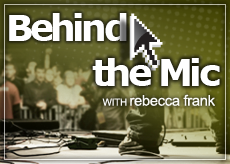Behind the Mic: Sponsorships
posted in: Features
 The word “sponsorship” may conjure images of sporting events or awareness marches, but musicians can certainly be sponsored too. In a world where record sales hardly add any change to the artist’s bank account, sponsorships are hugely beneficial to off-setting expenses racked up by travel, promotion, merch and more. In addition, sponsors can significantly improve an artist’s advertising, publicity and promotion.
The word “sponsorship” may conjure images of sporting events or awareness marches, but musicians can certainly be sponsored too. In a world where record sales hardly add any change to the artist’s bank account, sponsorships are hugely beneficial to off-setting expenses racked up by travel, promotion, merch and more. In addition, sponsors can significantly improve an artist’s advertising, publicity and promotion.
While there are several types of sponsorships out there, the most common for the music industry is a sponsorship where a band or artist is given free products to wear or use by the company. For example, a band can be sponsored by clothing companies, who gives the members free clothes to wear on stage or in photo shoots. A band could also be sponsored by a gear company who gives them free instruments, amps, etc. to play. The hopes for these companies is that fans and fellow musicians will see a band or artist using their products and, as a result, desire the same products.

Metal band Eyes Set to Kill decked out in gear from Skelanimals
Obviously, sponsors want to pick bands and artists that are talented, professional and have a large fan base. If you’re not quite there yet, aspire to start with a smaller company that offers sponsorships to local bands. After all, the likelihood is slim that the company sponsoring your favorite major label act will sponsor your band too. Like large corporations, local organizations need advertising too, and it will be much easier to set that up if you’re a local act.
If you think you’re ready for a larger-scale sponsor, there are a few things you’ll need to think about first. Before you get started, you need to decide which sponsors would be appropriate for you. For example, if you’re a rapper, you probably don’t want to propose a sponsorship to a clothing company that sells shirts at Hot Topic. It’s important to remember your music’s target demographic and consider companies that your fans might support.
Next, you will need to craft a proposal letter. This letter serves as an introduction of your band to the company and explain how you can mutually benefit from a partnership. Start by giving a BRIEF synopsis of your band’s background (no more than ten sentences) and include some facts about each member. Mention any major career highlights, including opening spots for well-known acts, statistics of sales from past releases and press clippings. Include a description of past tours, venues played and your average draw in a few markets. Along with this letter, you should include a few photos of your band and links to live performance videos.
A few final tips: try to send out as many proposals as you can and don’t get discouraged if you’re turned down. Remember that professionalism is key, so don’t be afraid to have a manager help you with this project. And if you’re chosen for a sponsorship, be sure to read through any legal documentation thoroughly with your band and any of your team members so you know exactly what the sponsor expects of your partnership.
